- Home
- Harlan Ellison
An Edge in My Voice
An Edge in My Voice Read online
An Edge in My Voice
Harlan Ellison
ACKNOWLEDGMENTS
During the three years, off-and-on, that these columns were being batted out, many people provided assistance: some in small ways, as with reference or research efforts; some in large ways, as unnamed sources of information who preferred to be kept on “deep background,” or as messengers, delivering my copy to the offices of the L.A. Weekly in the small hours of the night when I’d fall asleep over the typewriter. The proofreaders and typesetters at the Weekly who knew of my pathological desire to have the pieces published sans typos, who looked after the copy with special care. My office staff, who tossed an occasional grilled cheese sandwich at me as I labored. And most of all, the concerned readers whose suggestions as to subjects they wanted investigated or commented upon, who turned out for marches and at artistic events the column championed…those nameless dozens deserve my thanks. And yours.
But here are a few of the most important names, because they were invaluable: Sharon Buck, Ms. Marty Clark, Joanne Gutreimen, Barbara Krasnoff, Ed Naha, Stephanie O’Shaughnessy, Debra Spidell, Hank Stine, Sarah L. Wood and Bob Woods.
And very special thanks are herewith extended to Gil Lamont, Shelley Levinson and my two most significant editors, Kay Reynolds of Donning and Phil Tracy of the Weekly.
FOREWORD
BY TOM SNYDER
In SHATTERDAY, Harlan Ellison assured all of us that we share the same fears. That the one thing none of us have to be afraid of is admitting that we are afraid of the scary dreads that lurk inside us all. I have been sitting staring at the keys of this machine since three months ago. Then, Ellison asked if I would write a foreword to this book. A collection of more of his rantings and ravings that I first experienced very late one night on a defunct television program named “Tomorrow.” I liked Ellison then and I like him now. He honored me with his request. He flattered me. I accepted. And for three months I have been staring at the keys on this machine, in stark terror.
For years, I have written for television news programs. I think much of it has been pretty good, but if I set it down right here in front of you, few would remember a word of it. That’s because television news writing disappears rapidly. It comes on, it goes off, and it disappears. It doesn’t lie around gathering shelf dust for years and then one rainy night beckon your curiosity from the book-table. I called Ellison three days ago and confessed to him I didn’t have the foggiest notion of what a foreword to a book was all about. That I was terrified to think whatever words I strung together would be available for the jeering and ridicule of the audience forever. The good pieces I wrote for television would always be a private satisfaction to me. The dumb ones—the really horrid crap I had dashed out with no thought and less preparation—those were gone and forgotten and nobody would ever know of them and thank God for that. But here I was facing a foreword to a Harlan Ellison book.
Ellison has written forty-some books, won every award his peers can give him, has legions of fans around the world who hang on his every word as if they were struck in stone, and he—he who has taken to college lectures and Trekkie conventions so he will never again have to write for television because he hates it so deeply—wants a “television schlep”—as he loves to define us—to write a foreword to his book. For me to write anything in the same book with Harlan Ellison makes about as much sense as having me hit tee shots for Jack Nicklaus. I confessed that to him, and he laughed and said to make believe the whole thing was writing a letter to a friend; simply to have fun.
I think Harlan Ellison has fun. Here’s a little guy who every now and then drops into my life and points out that humans are the craziest people. We go absolutely nuts when New York State offers a winner $22,000,000 (that’s right folks, twenty two million dollars) in a lottery. But New York State doesn’t have the money to fix the highways and keep the bridges from falling down. Ellison has made me aware of things like that—the great contradiction between what we are and what we think we are. I want to believe that most of us have had sufficient of the current diet of news slime: How a Kennedy really died; are Brooke Shields and Michael Jackson more than good friends; is Boy George really a boy; and so on and so on and so on until your brain can’t stand it any longer. Ellison delights in cutting through all the smarm. He fights battles most of us haven’t even thought of, much less cared about. If you know anything of Frances Farmer, you’ll recall how she challenged everything hypocritical about God and Country. The so-called guardians of the public good cut her brain out to rid us all of cynicism and skepticism but it didn’t work. Watching a movie about her reminded me of Harlan Ellison. He fights the wars that aren’t even worth fighting, and delights in our frustration when we finally figure it out. Guys like Harlan know we can’t win ’em all, but we sure-as-shooting better win some, or else the guy who said, “Life’s a bitch, and then you die!”, will wind up being right.
The writer in the book follows. Along the way, you’ll hear him say that he wrote much of this a long time ago, and that when he asks you to write him about certain things, he meant for you to write him then, but that he doesn’t want to hear from you now.
He’s just kidding.
—Tom Snyder
29 May 84
TO THE MEMORY OF CHARLES BEAUMONT
2 JANUARY 1929–21 FEBRUARY 1967
A PRINCE FROM A FAR LAND
INTRODUCTION: Ominous Remarks for Late in the Evening
Both Hemingway and Scott Fitzgerald discovered a peculiar syndrome that affected critics of their work. They learned in the roughest way imaginable that if they were praised as great, fresh talents early on in their careers, that as they approached the middle years of writing they were “reevaluated.” The second guessers and the parvenus who could not, themselves, create the great and fresh stories, made their shaky reputations by means of pronunciamentos that advised those few literati who gave a damn, that les enfants terribles were now too long in the tooth to produce anything worth reading; that they were past it; and in the name of common decency should embarrass themselves no further by packing it in and retiring to the cultivation of Zen flower gardens. So they both croaked, and did the heavy deeds of assassination for their critics. But had they somehow managed to overcome cancer and alcoholism, had they managed to squeak through for another decade, they’d have found themselves lionized. Each would have made it through the shitrain to become le monstre sacré. Grand old men of letters. National treasures. Every last snippet they’d tapped out on yellow second-sheets sold at Sotheby’s for a pasha’s weight in rubies.
They never made it. Not rugged, spike-tough old Ernest, not lighter-than-air Scott. Time and gravity and the nibbling of minnows did them in. And so they don’t know that they are still famous—though seldom read—in the way that talk show guests are famous: you know their names and often their faces, but you can’t quite remember what the hell it is they did to make them “famous.”
The lesson we who work behind the words learn from this is that if your life is as interesting as your work, or even approaches that level of passion, there will be those who are not-quite-good-enough waiting in the tall grass, waiting to compound your fractures when your brittle bones splinter.
Never get too fat, never get too secure. The rat-things are waiting. Just hang in there long enough, like Borges or Howard Fast or Graham Greene or Jean Rhys, and the sheer volume of accumulated years will daunt all but the most vicious (who quickly self destruct when they try to savage the icons).
The fine novelist Walter Tevis, a sweet man who died on August 9, 1984, knew more than his share of pain. Walter once told me, when I was bitching about constantly being pilloried for trying to startle readers into wakefulness with fiery prose, �
��You can’t attract the attention of the dead.”
I am well in mind of that epigraph as I sit here writing an introduction to a book of occasional pieces, essays, columns done to a monthly or weekly deadline, that passed along to my readers the world I observed at those times. In the words of Irwin Shaw: “He is engaged in the long process of putting his whole life on paper. He is on a journey and he is reporting in: ‘This is where I think I am and this is what this place looks like today.’”
Well in mind of Walter’s consoling observation as I consider a scurrilous bit of business published in a jumped-up comic book called Heavy Metal last October 1983. A vitriolic hate-piece accurately titled “Hatcheting Harlan,” as written by one of the universe’s great prose stylists, Gus Patukas. If the name rings no carillons, don’t go searching through THE READER’S ENCYCLOPEDIA or WEBSTER’S AMERICAN BIOGRAPHIES. Turns out Gus is a kid who lives in Brooklyn; buddy chum of a Heavy Metal editor whose own literary accolades are on the level of sucking fish-heads. They’re into swagger, but not much into writing anything that will outlast the paper it’s printed on.
But the best part of the attack came several issues later, in the letter column of this illustrated irritation dedicated to drawings of women with breasts the size of casaba melons and comic strips in which people get their heads blown open like overripe pomegranates. Rather than admitting that they’d received several hundred outraged letters from readers who thought I might have a few good minutes left in me, they presented a “balanced response” by dummying up a couple of letters saying good for Patukas and ever-vigilant Heavy Metal, for bringing to his knees that fraud Ellison, who never could write for sour owl poop to begin with. One of these letters contained the statement that Ellison is an enemy of the People.
“Liberty is better served by presenting a clear target to one’s opponents than by joining with them in an insincere and useless brotherliness.”
—Benedetto Croce, 1866–1952
Italian philosopher, historian,
statesman, and literary critic.
I thought about that one for some time. And then I had to smile. The author of that letter, someone who signed himself “William Charles Rosetta, LA, California” (though no such person—as one with the “Jon Douglas West” you will encounter in these pages—seems to exist in Los Angeles or anywhere else), had miraculously stumbled on a hidden truth.
I am, indeed, an enemy of the people.
Ibsen, who noted that “To live is to war with trolls,” codified the “enemy of the people” in his classic drama about a courageous man who tells the truth about a public menace—the contamination of the town’s famous healing spring waters—which will bring about the community’s economic demise. This honest man, Dr. Thomas Stockmann, plans to shut down the springs to make improvements for the public good. But when “economic realities” dictate otherwise, Stockmann’s brother, Peter, who is the mayor, undercuts his efforts by turning him from a hero in the eyes of his neighbors, into “an enemy of the people.”
“If fifty million people say a foolish thing, it is still a foolish thing.”
—Anatole France
The sixty-one personal essays that make up this book are my proud statement of enmity toward the people. Not just to people like Patukas and “Rosetta” and the pinheads at Heavy Metal whose dreary little lives move them to such ignoble attacks of foaming idiocy against their betters, but enmity toward the censors and the pro-gun lobbyists and the filmmakers who brutalize women in the name of “art” and the smoothyguts politicians who secure their futures with arms manufacturers by stealing money from the schools and the lousy writers who monopolize the spinner racks and their venal publishers who have destroyed the mid-list in search of bestsellers and the bible-thumpers who want prayer in the schools as long as we pray to their God and to the gray little bookkeepers who know their dancing decimal points cheat honest men and women out of their annuities and the garage mechanics who lie and tell you they can’t repair that thingamajig unless you buy a new whatzit for seventy-five bucks and the headless snakes that are the multinational corporations that remove products you like from the supermarkets because cheaper items move more units per capita and the terrorists and the zealots and the true believers and the insensitive and the dull-witted and the self-righteous. All of whom are parts of “the people.”
“I have sworn eternal hostility against every form of tyranny over the mind of man.”
—Thomas Jefferson
You’d better believe it, I am an enemy of the people. The people who stand by and do nothing. The ones who don’t want to get involved, and the ones who don’t want to risk a dime of their money; the ones who permit evil to walk unchecked, and the ones who abet the monsters because “If I didn’t do it, someone else would”; the ones who beat up their kids because they’re part of the household goods, and the ones whose rapaciousness gives them coin to bully the weak. I am foursquare and forever till the moment I go under…an enemy to the people who lie to you and want to keep you stupid. To those who sell you shitty rock music and drive classical and jazz off the FM dial, to those who tell you wallboard is better than lath and plaster, to those who say bad grammar is okay as long as you understand (however vaguely) what’s being said. To the ginks and the creeps and the trendies and the destroyers of the past, who deny you your future.
I am a yapping dog with mean little teeth. I am as often as wrong as you, as often silly as you, as often co-opted as you, as often sophomoric as you. But I maintain. As do you.
And here, in these sixty-one personal essays that need no introduction because they are, themselves, introductions, I pass along what I saw and wrote about for three years, from August 1980 to January 1983. (With a one-shot relapse in August of 1984.)
They were written with an edge in my voice, and they may make no more profound statement than to assure you that for the duration of this book you are in no other hands than those of an enemy of the people.
“Look for a long time at what pleases you…and longer still at what pains you.”
COLETTE
“Common sense is instinct. Enough of it is genius.”
GEORGE BERNARD SHAW
“…the main purpose of criticism…is not to make its readers agree, nice as that is, but to make them, by whatever orthodox or unorthodox methods, think.”
JOHN SIMON, 6 FEBRUARY 84
“By the great might of figures (which is no other thing than wisdom speaking eloquently), the orator may lead his hearers which way he lists, and draw them to what affection he will; he may make them to be angry, to be pleased, to laugh, to weep, and lament; to love, to abhor, and loathe; to hope, to fear, to covet; to be satisfied, to envy, to have pity, and compassion; to marvel, to believe, to repent; and briefly to be moved with any affection that shall serve best for his purpose.”
HENRY PEACHAM,
THE GARDEN OF ELOOUENCE
1577
Interim memo
In this first installment of the column, I solicited letters from readers. This comes solidly under the heading of Yes, of course I’d like an enema with a thermite bomb, Monsieur de Sade. Later, in Installment 7, and every six weeks when the column moved to the Los Angeles Weekly, I would attempt to answer those whose letters were something more than deranged vampire-bat gibbering. You’ll read all that lunacy later. But I drop the notice here, that this is a book, not a periodical, and I truly honestly don’t want any more mail on these columns. Not that I don’t love you all, but the subject matter has been dealt with fully; and Monday morning quarterbacking now that these words have been collected will only chew the meal twice. So, though we’ve decided to let the material stand as it was published (with typos corrected, of course), just forget it when you encounter a solicitation for comment. Let me say it again, just to get through to that one twit out there who never gets the word: Don’t send me letters asking or commenting. I’m dead, the magazines were bombed out of existence, this publisher has gone into the grain and fe
ed business, and you’ll only be wasting your time and money.
INSTALLMENT 1: 25 MARCH 80
PUBLISHED 10 JUNE 80 FUTURE LIFE #20 COVER-DATED AUGUST
Darkness falls early. From the horizon comes the wail of creatures pretending to be human. The red tide has come in, and shapeless things float toward the shore. He stands before the altar of Art, naked and with fists raised, and he vows: I will not be lied to.
Hello. My name is Harlan Ellison and I am a writer. This is a new home for my words and I’m in the process of moving in. Much of my personal furniture has yet to arrive. I’ll be furnishing this space from month to month and though I’m aware some of my taste may not parallel yours, I bring with me several items whose beauty I do not think you will contest. The first is a determination to entertain you.
No matter what comes past my window, no matter what doings and philosophies and people are trapped for comment, I will bring to any discussion of them a resolve to keep your attention. Entropy is fed by boredom; and I am anti-entropy.
The second item already installed is a sense of ethics. I cannot be bought. This magazine has rented my words, but by contract they cannot edit them or change them or try to sway me to say things I would not say of my own volition. Truth is the greater part of these ethics and I will do my best to tell it as I know it. Sometimes I’ll be wrong—I can be fooled as easily as you—but I have no doubt you’ll let me know when that happens.
The third item I bring to this new residence is taste. Some have said I have good taste, high standards, a sense of what is worthy. Others have disagreed. I cannot espouse the taste of others, only my own. But I’m told it is that special view that is required here. I seldom agree with the mass, I despise bad writing, meretricious film-making, appeals to the lowest possible common denominator of cheap titillation, attempts to package snake-oil as a cancer cure, and I reject the notion that you are a vast audience of dumb, gullible children who will endorse even the shabbiest product if it comes heavily advertised.

 Repent, Harlequin! Said the Ticktockman
Repent, Harlequin! Said the Ticktockman Broken Glass
Broken Glass Other Glass Teat
Other Glass Teat Memos From Purgatory
Memos From Purgatory I Have No Mouth and I Must Scream
I Have No Mouth and I Must Scream The Deadly Streets
The Deadly Streets The Glass Teat
The Glass Teat Paingod and Other Delusions
Paingod and Other Delusions No Doors No Windows
No Doors No Windows Strange Wine
Strange Wine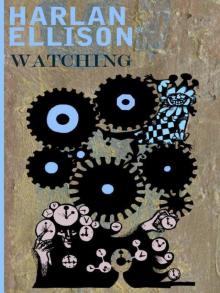 Harlan Ellison's Watching
Harlan Ellison's Watching Over the Edge/An Edge in My Voice
Over the Edge/An Edge in My Voice Troublemakers: Stories by Harlan Ellison
Troublemakers: Stories by Harlan Ellison Gentleman Junkie and Other Stories of the Hung-Up Generation
Gentleman Junkie and Other Stories of the Hung-Up Generation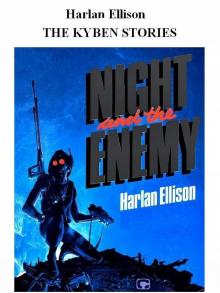 The Kyben Stories
The Kyben Stories From the Land of Fear
From the Land of Fear The Top of the Volcano: The Award-Winning Stories of Harlan Ellison
The Top of the Volcano: The Award-Winning Stories of Harlan Ellison Sleepless Nights in the Procrustean Bed
Sleepless Nights in the Procrustean Bed Ellison Wonderland
Ellison Wonderland Children of the Streets
Children of the Streets Can & Can'tankerous
Can & Can'tankerous Love Ain't Nothing but Sex Misspelled
Love Ain't Nothing but Sex Misspelled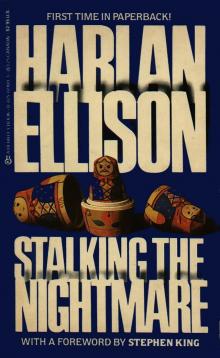 Stalking the Nightmare
Stalking the Nightmare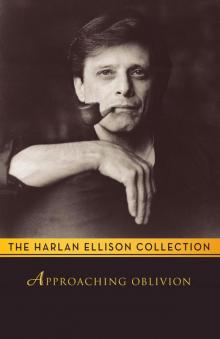 Approaching Oblivion
Approaching Oblivion Deathbird Stories
Deathbird Stories Partners in Wonder
Partners in Wonder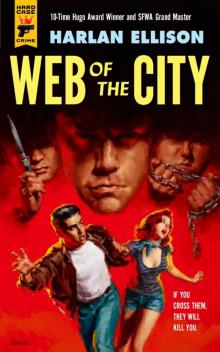 Web of the City
Web of the City Spider Kiss
Spider Kiss A Boy and His Dog
A Boy and His Dog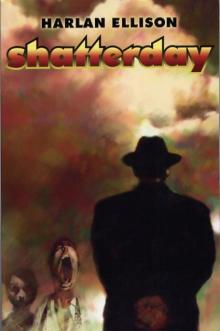 Shatterday
Shatterday Slippage: Previously Uncollected, Precariously Poised Stories
Slippage: Previously Uncollected, Precariously Poised Stories Repent, Harlequin! Said the Ticktockman
Repent, Harlequin! Said the Ticktockman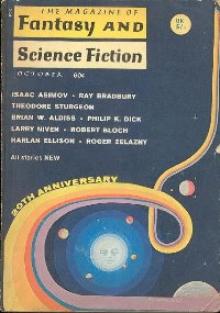 Come to Me Not in Winter's White
Come to Me Not in Winter's White The Song the Zombie Sang
The Song the Zombie Sang The Other Glass Teat
The Other Glass Teat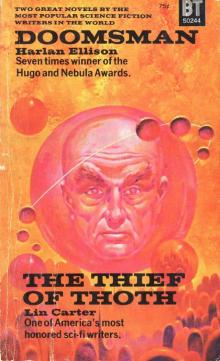 Doomsman - the Theif of Thoth
Doomsman - the Theif of Thoth The City on the Edge of Forever
The City on the Edge of Forever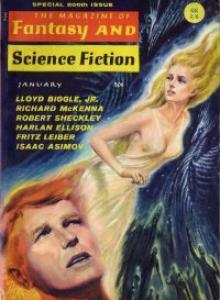 I See a Man Sitting on a Chair, and the Chair Is Biting His Leg
I See a Man Sitting on a Chair, and the Chair Is Biting His Leg The Harlan Ellison Hornbook
The Harlan Ellison Hornbook Pulling A Train
Pulling A Train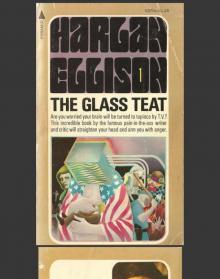 The Glass Teat - essays of opinion on the subject of television
The Glass Teat - essays of opinion on the subject of television An Edge in My Voice
An Edge in My Voice Angry Candy
Angry Candy Troublemakers
Troublemakers The Top of the Volcano
The Top of the Volcano Over the Edge
Over the Edge Survivor #1
Survivor #1 Slippage
Slippage